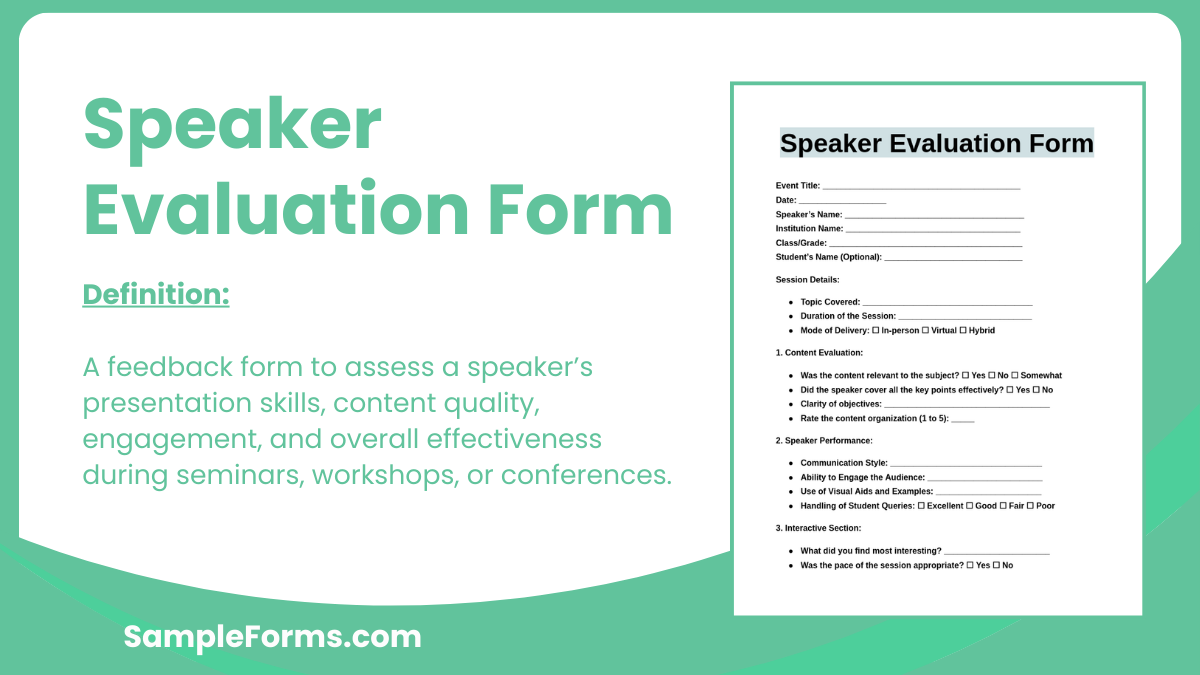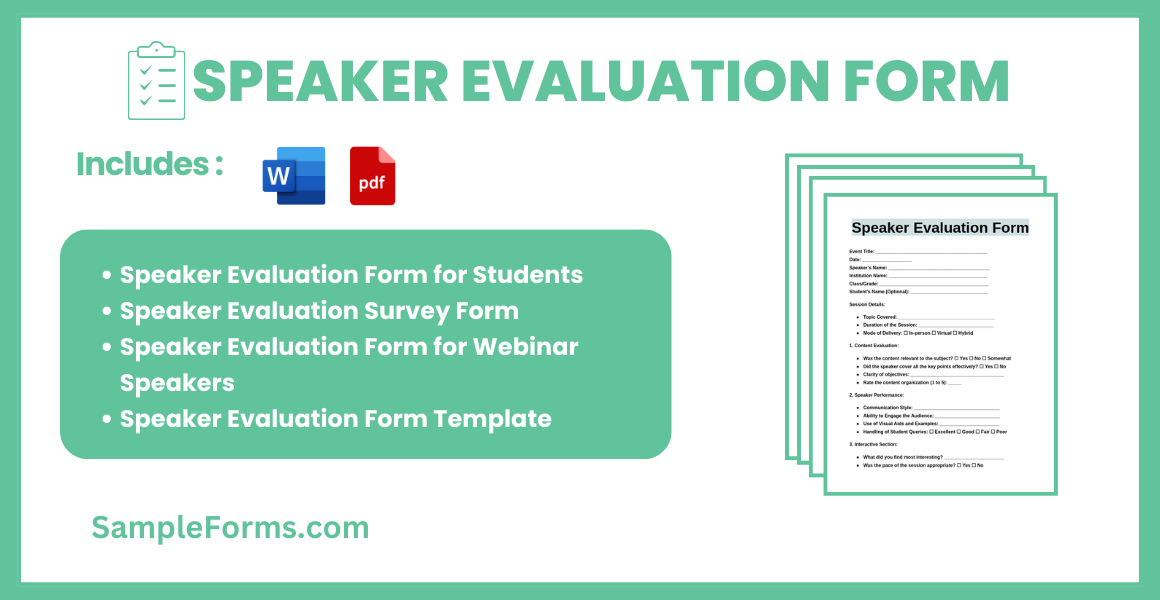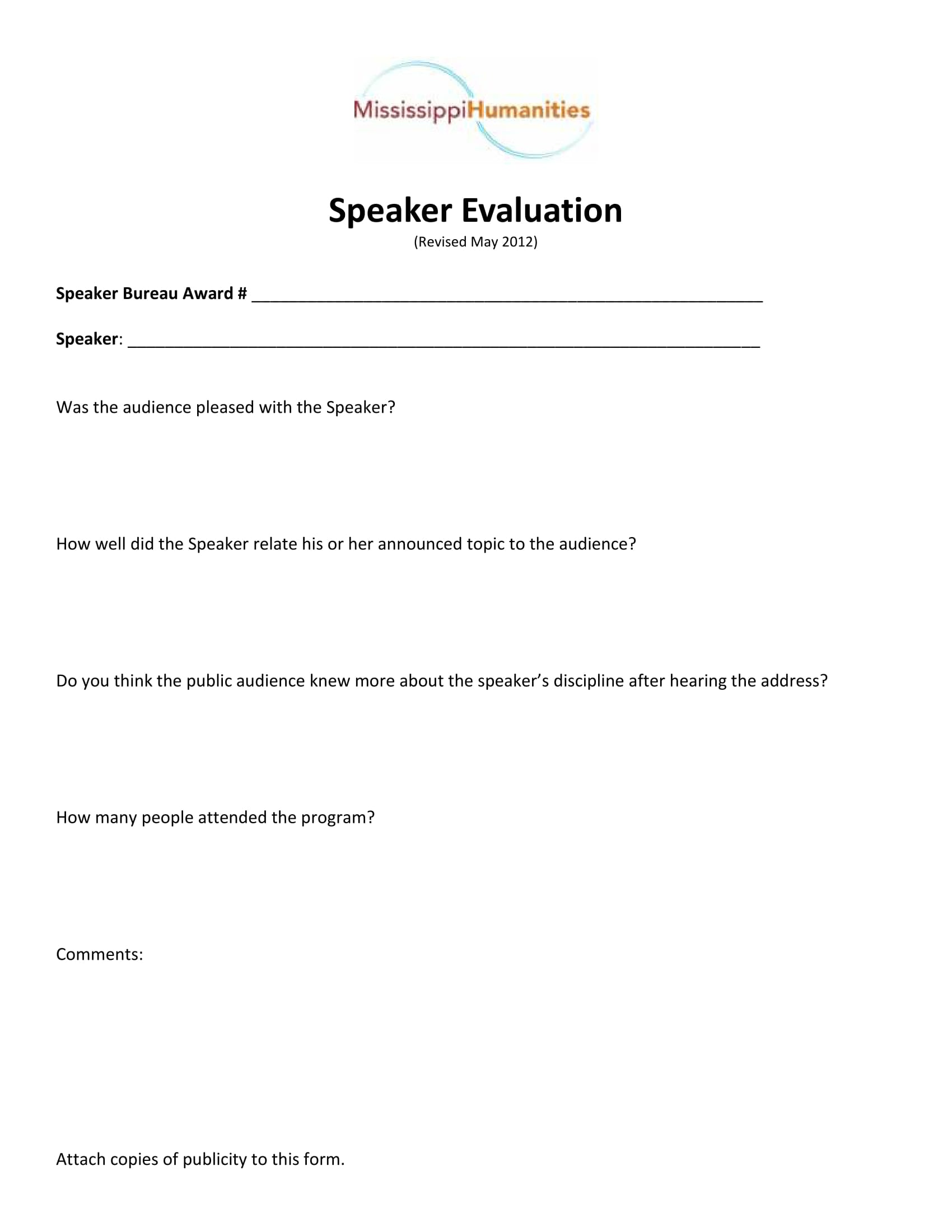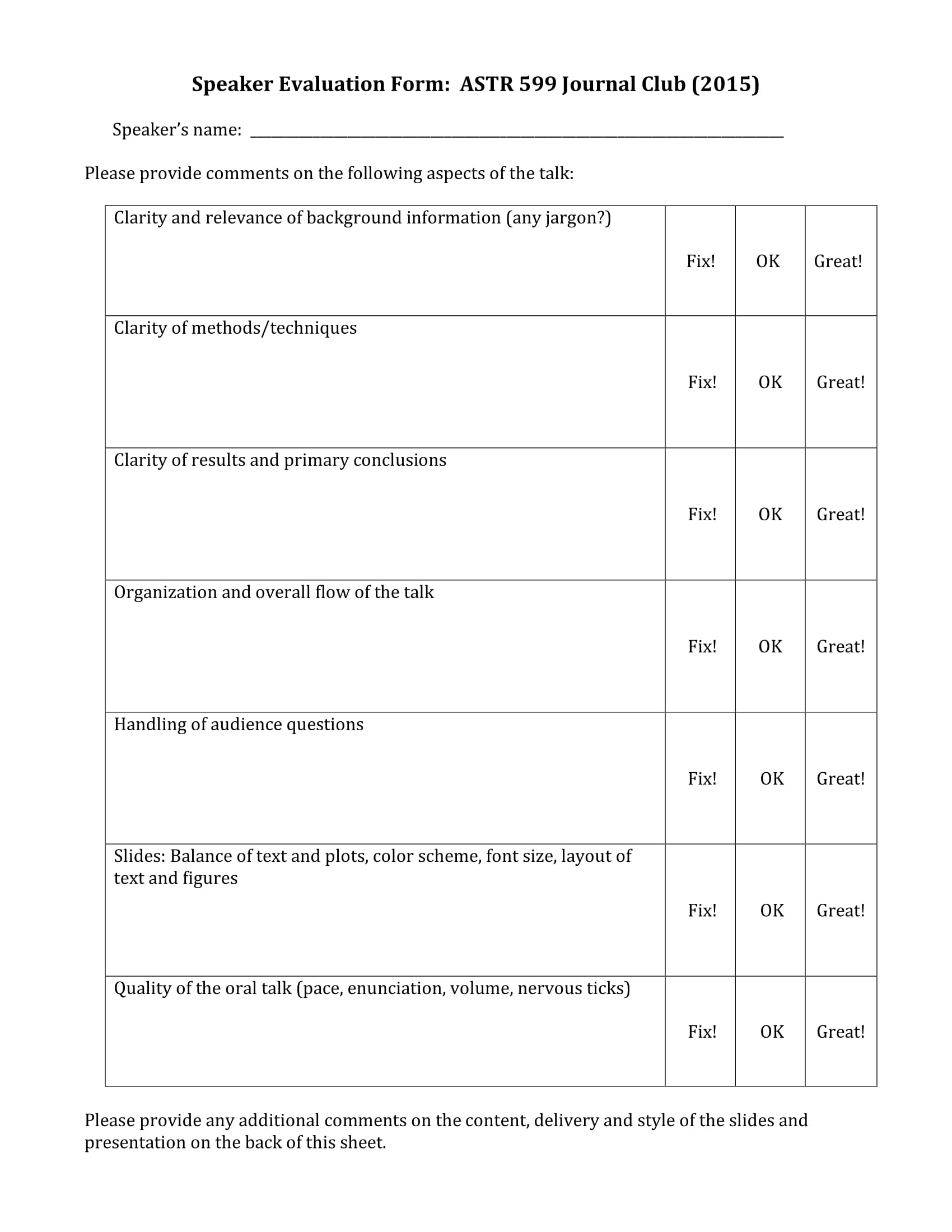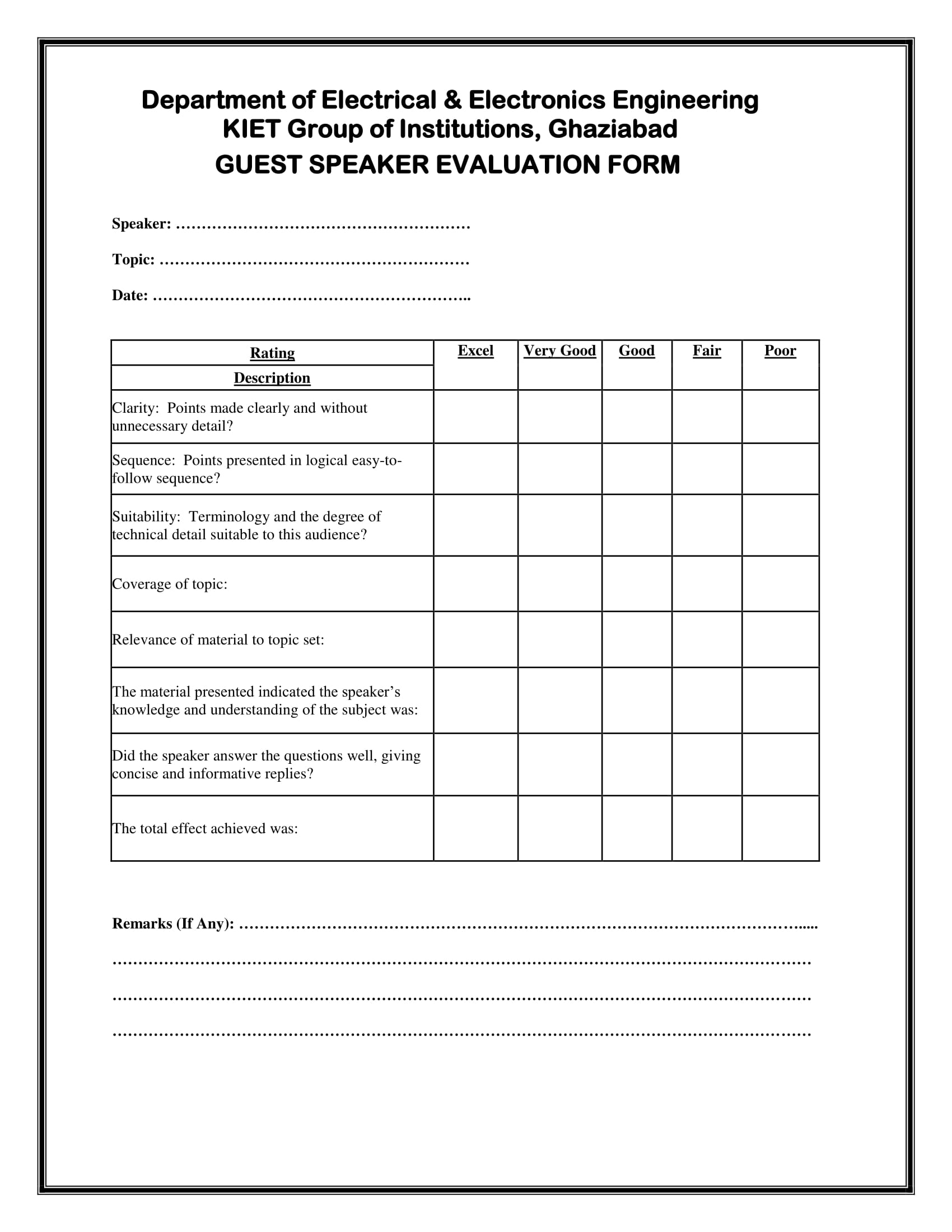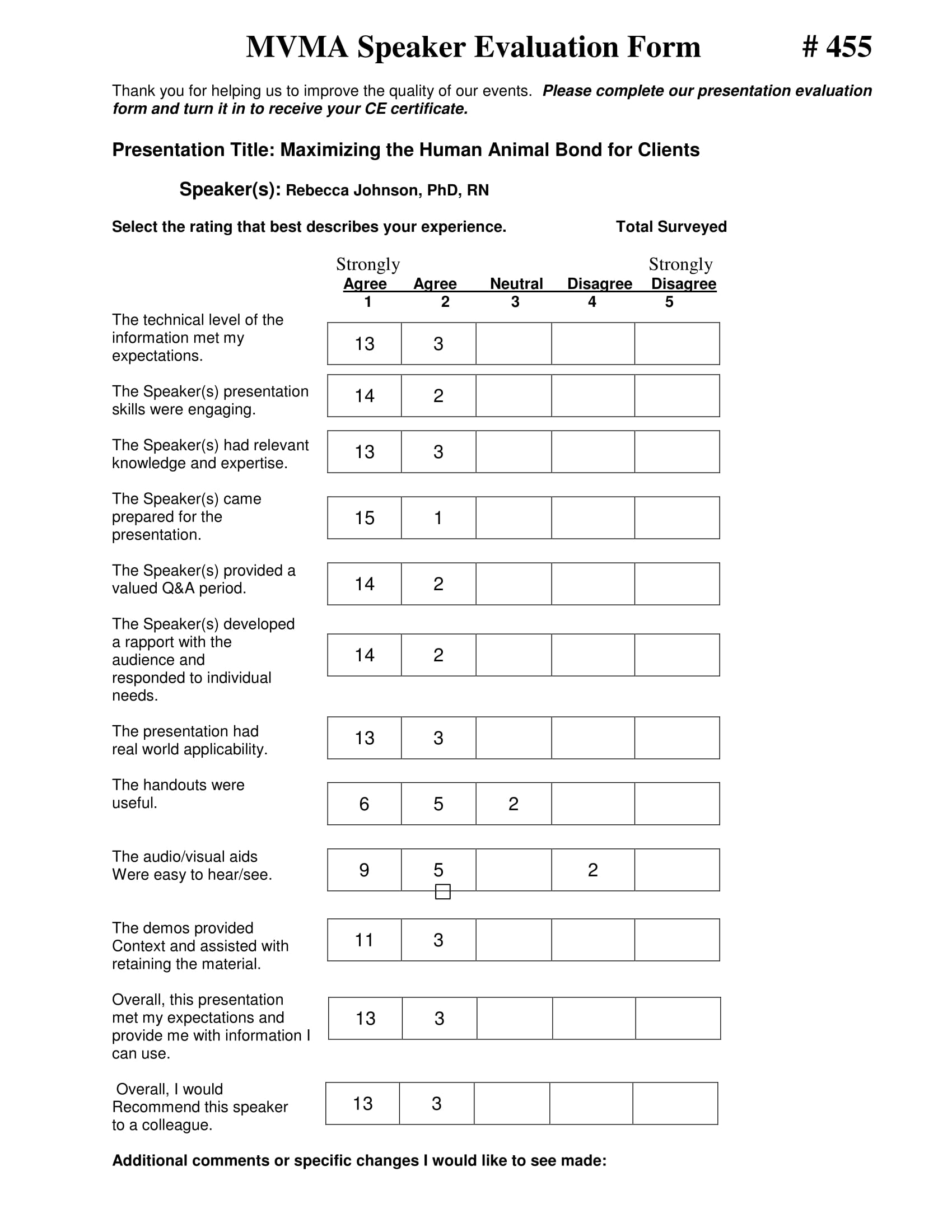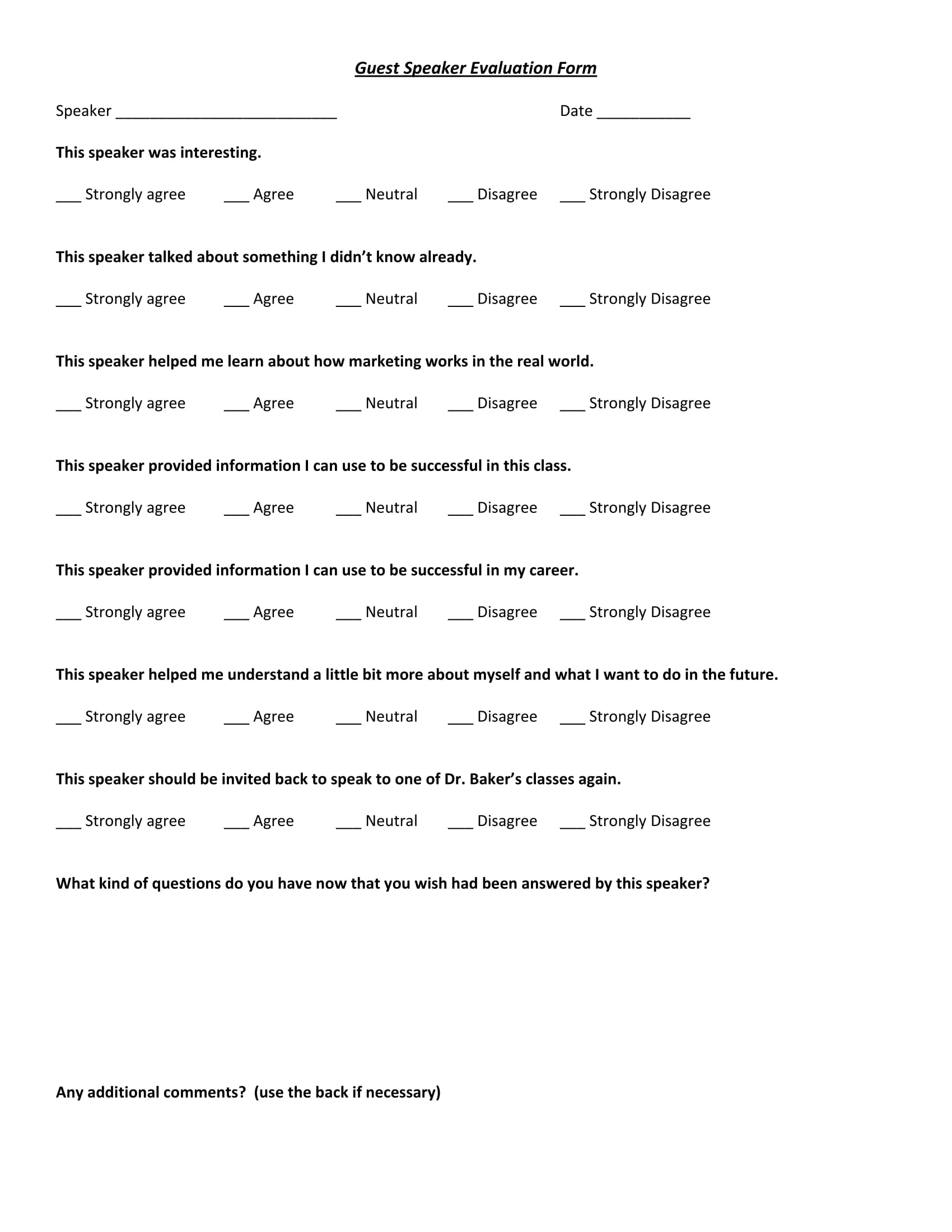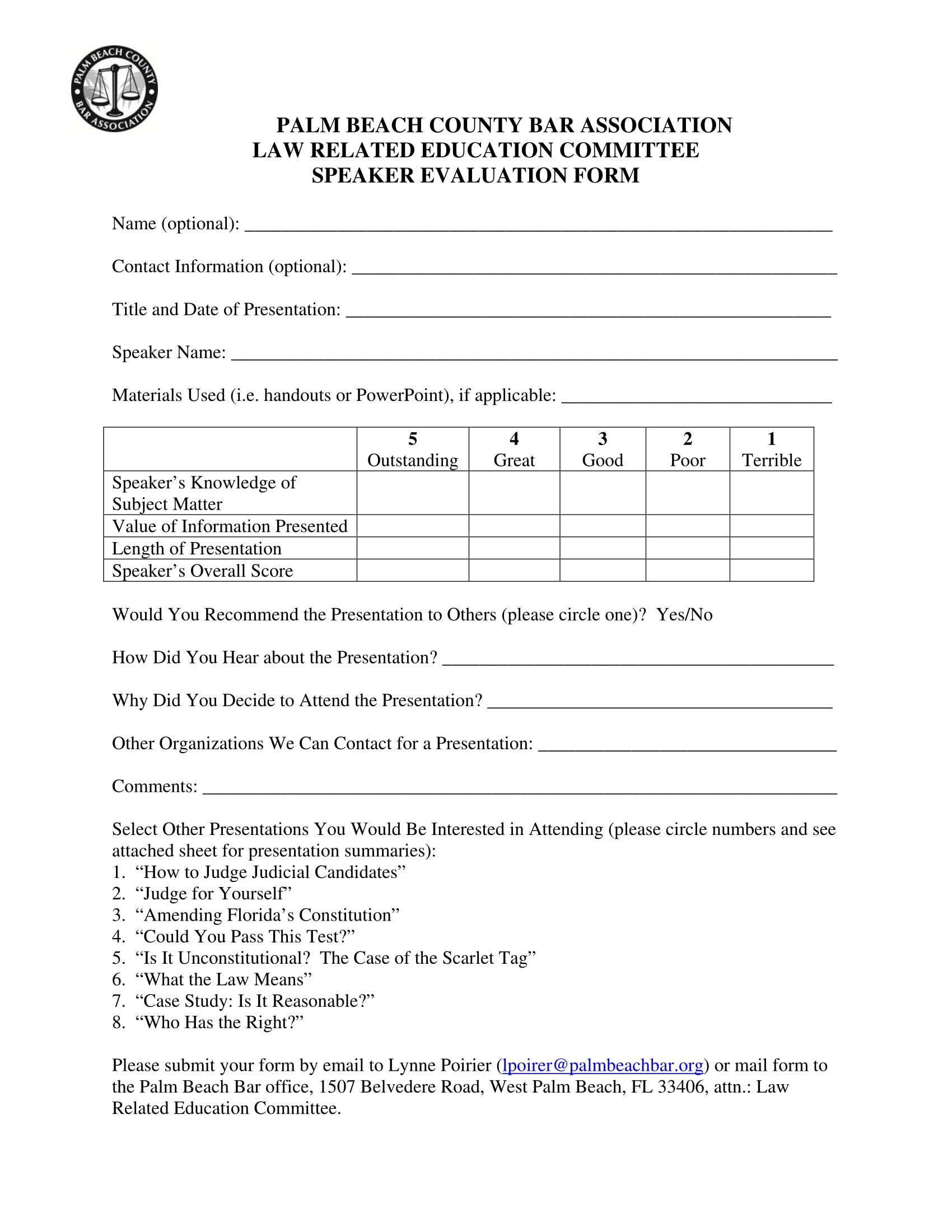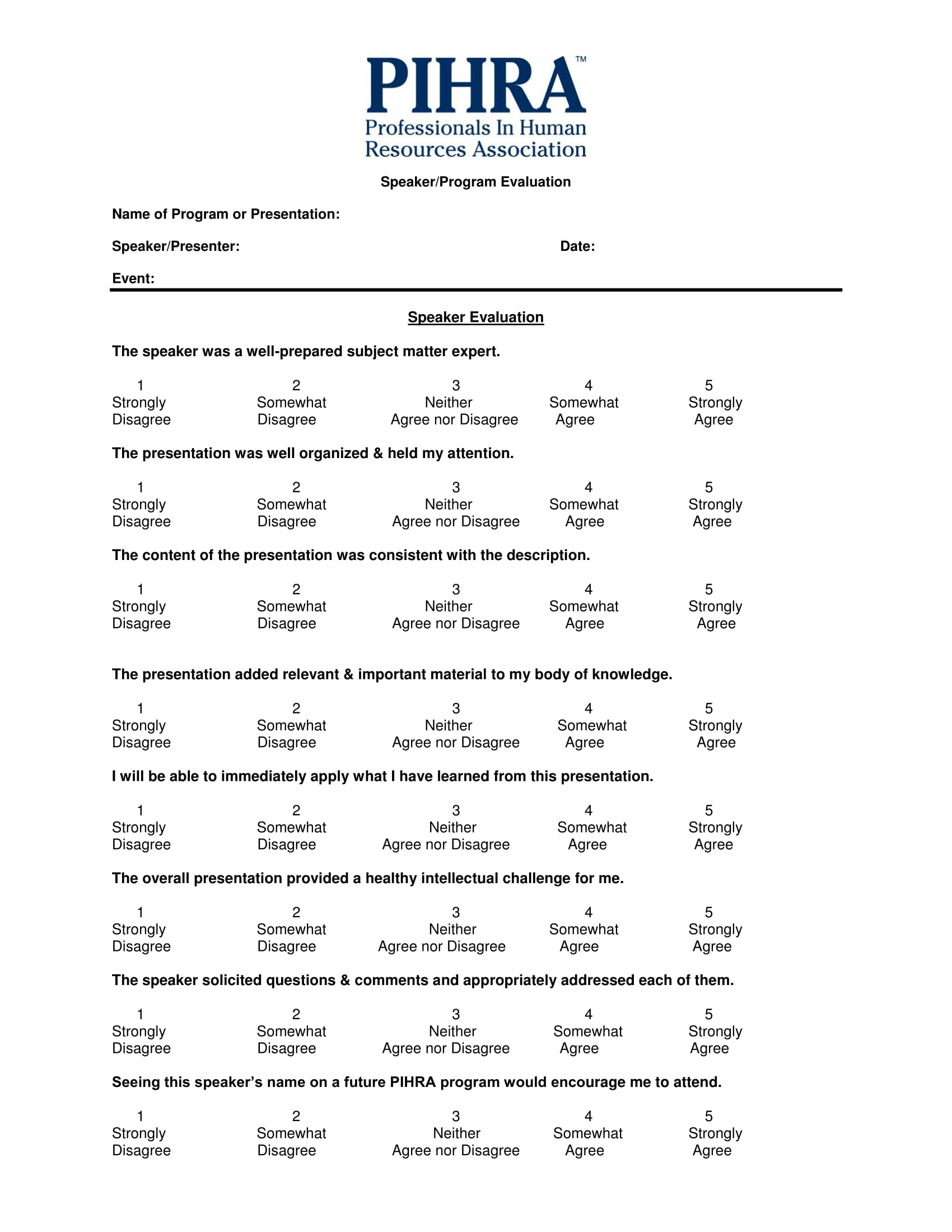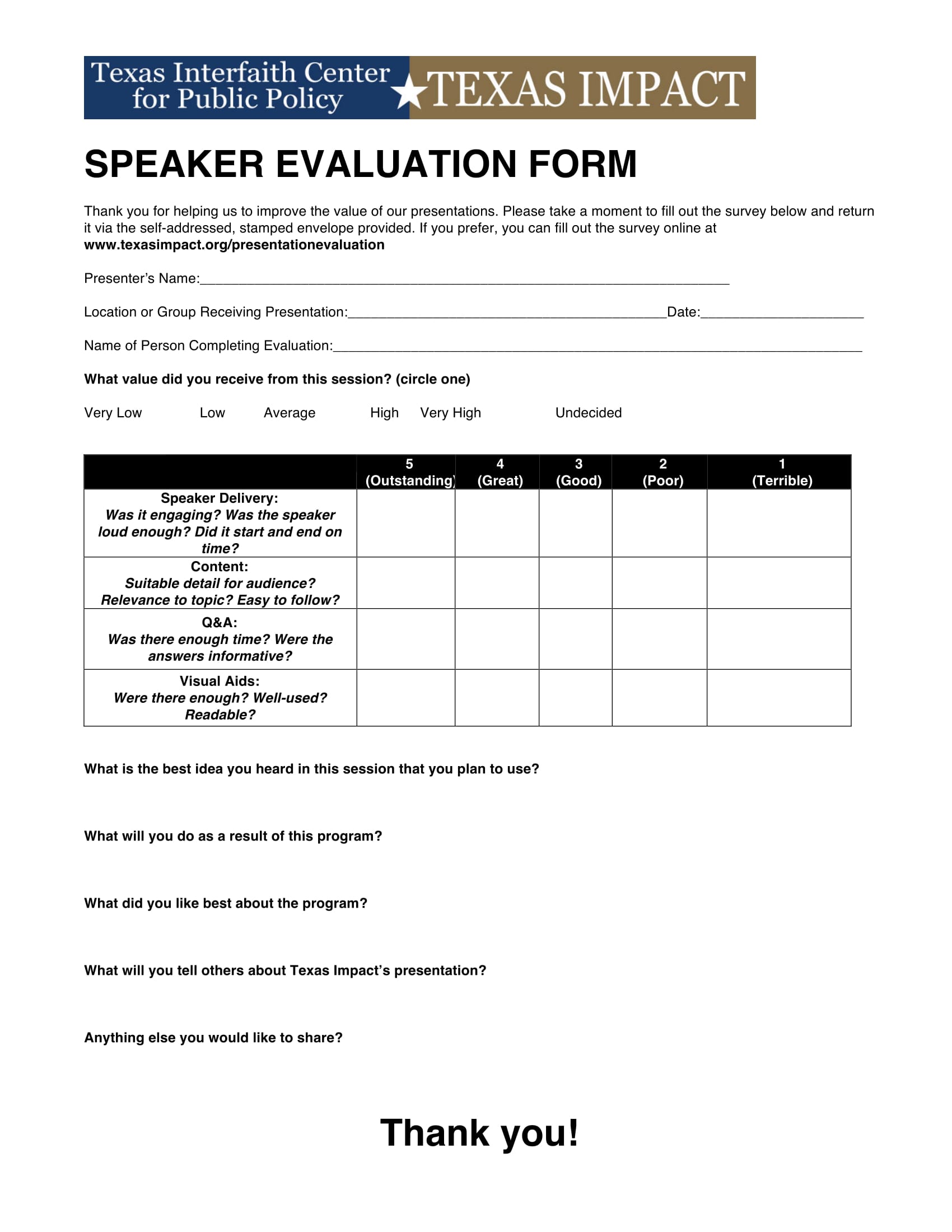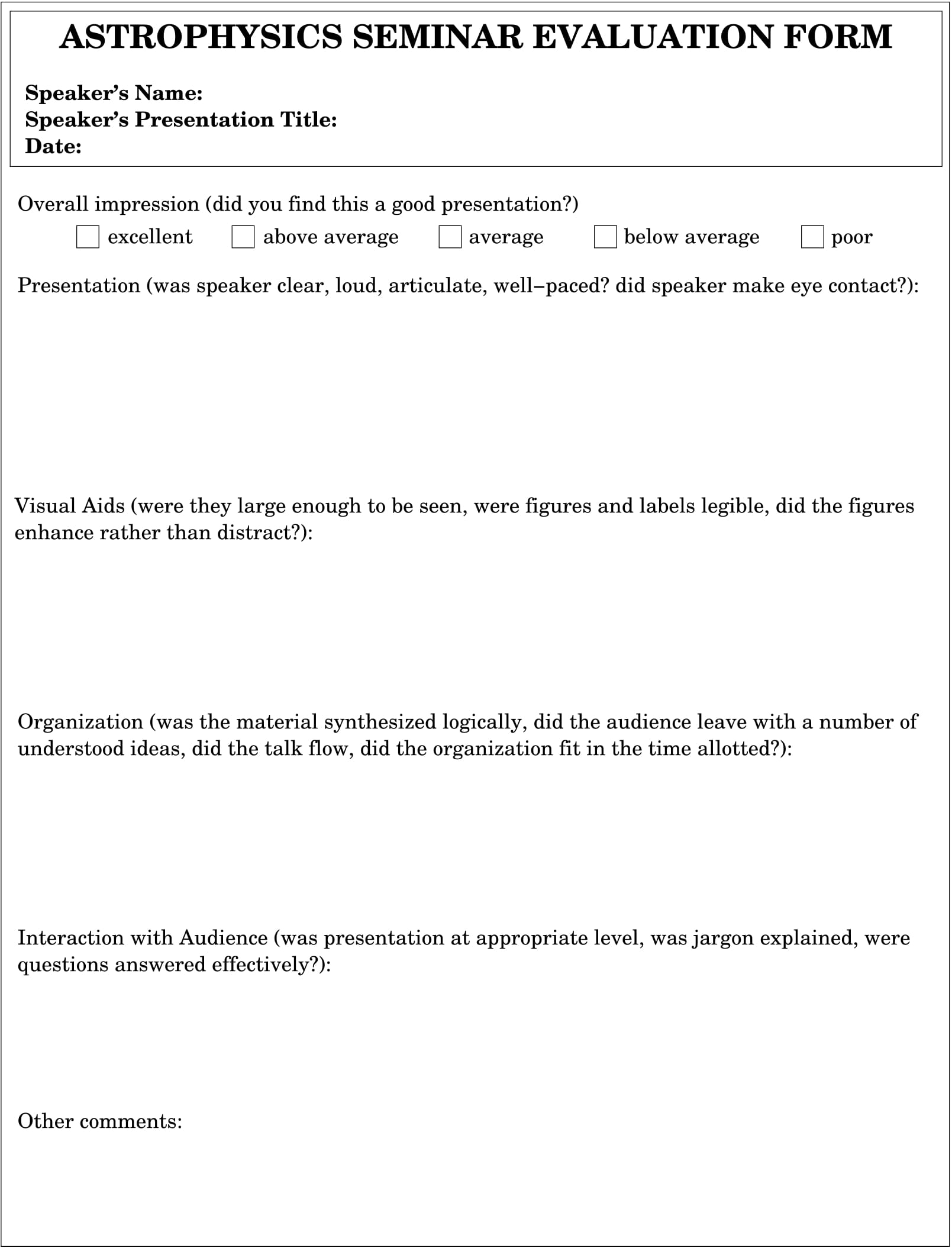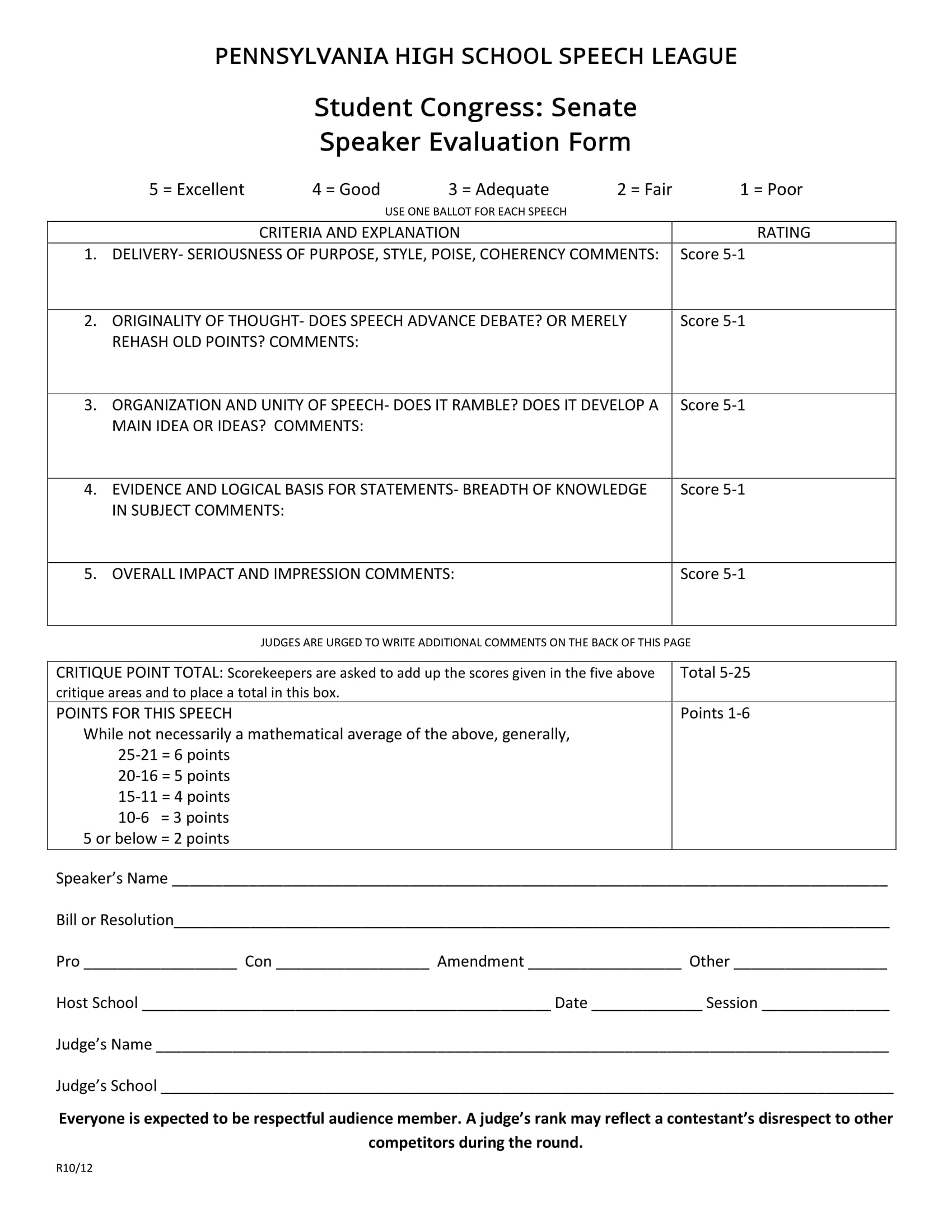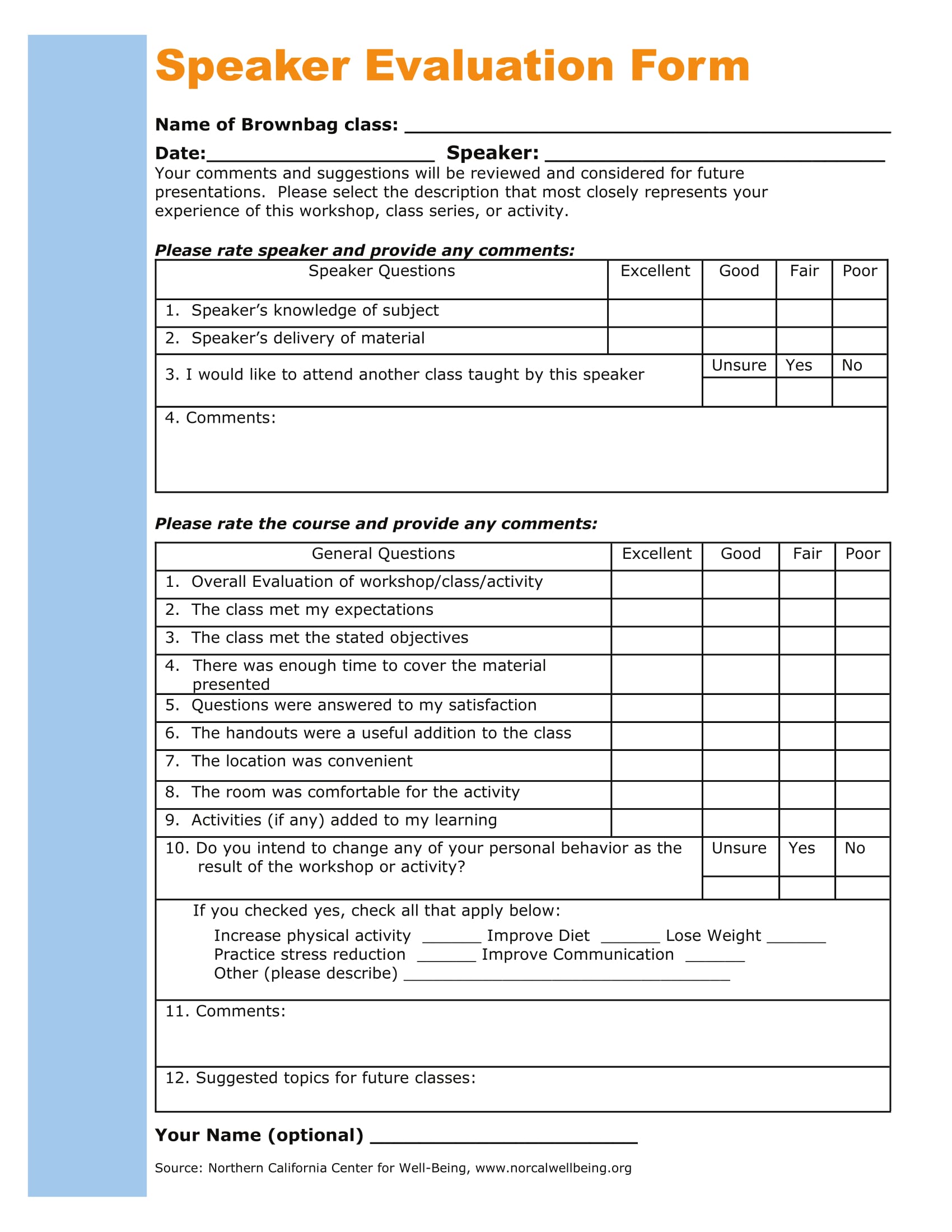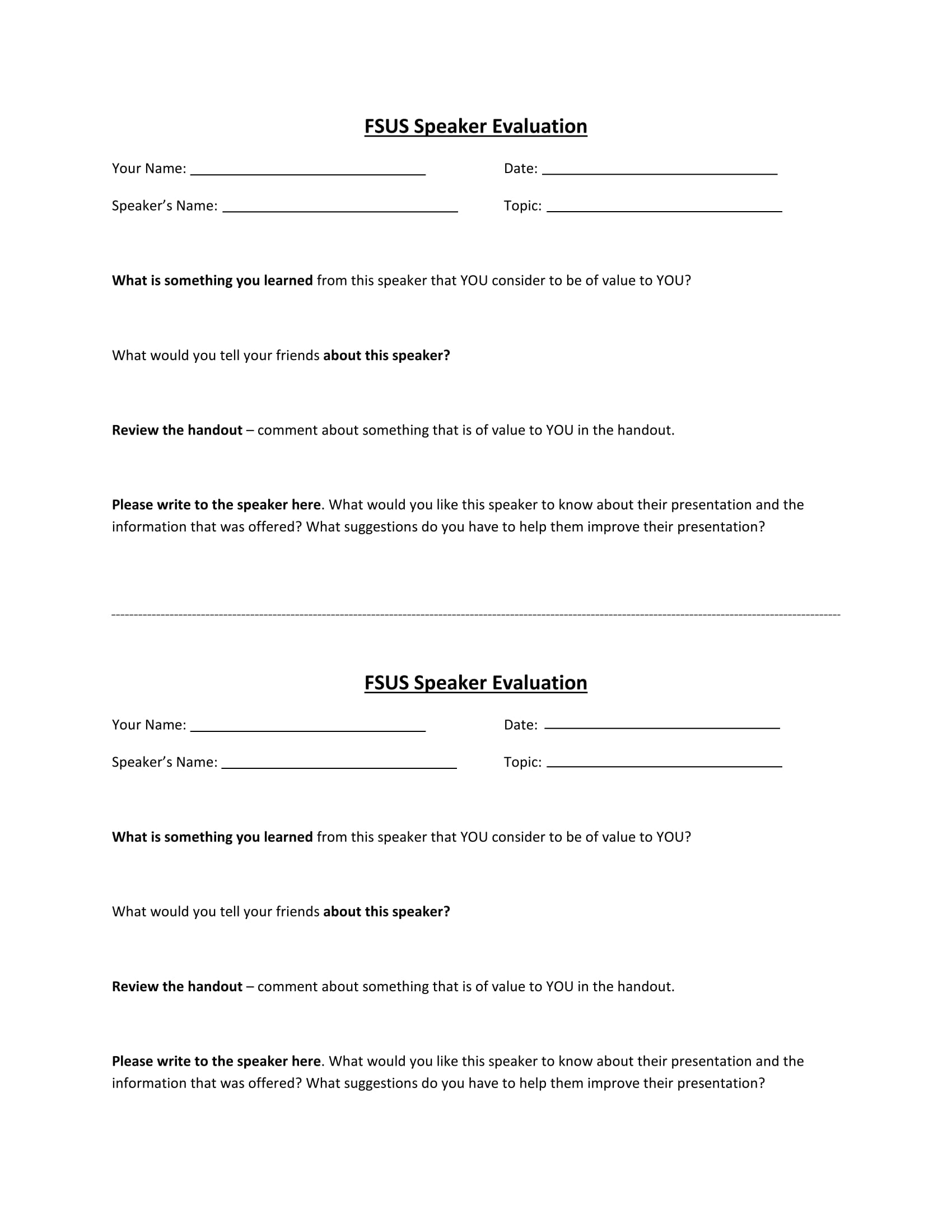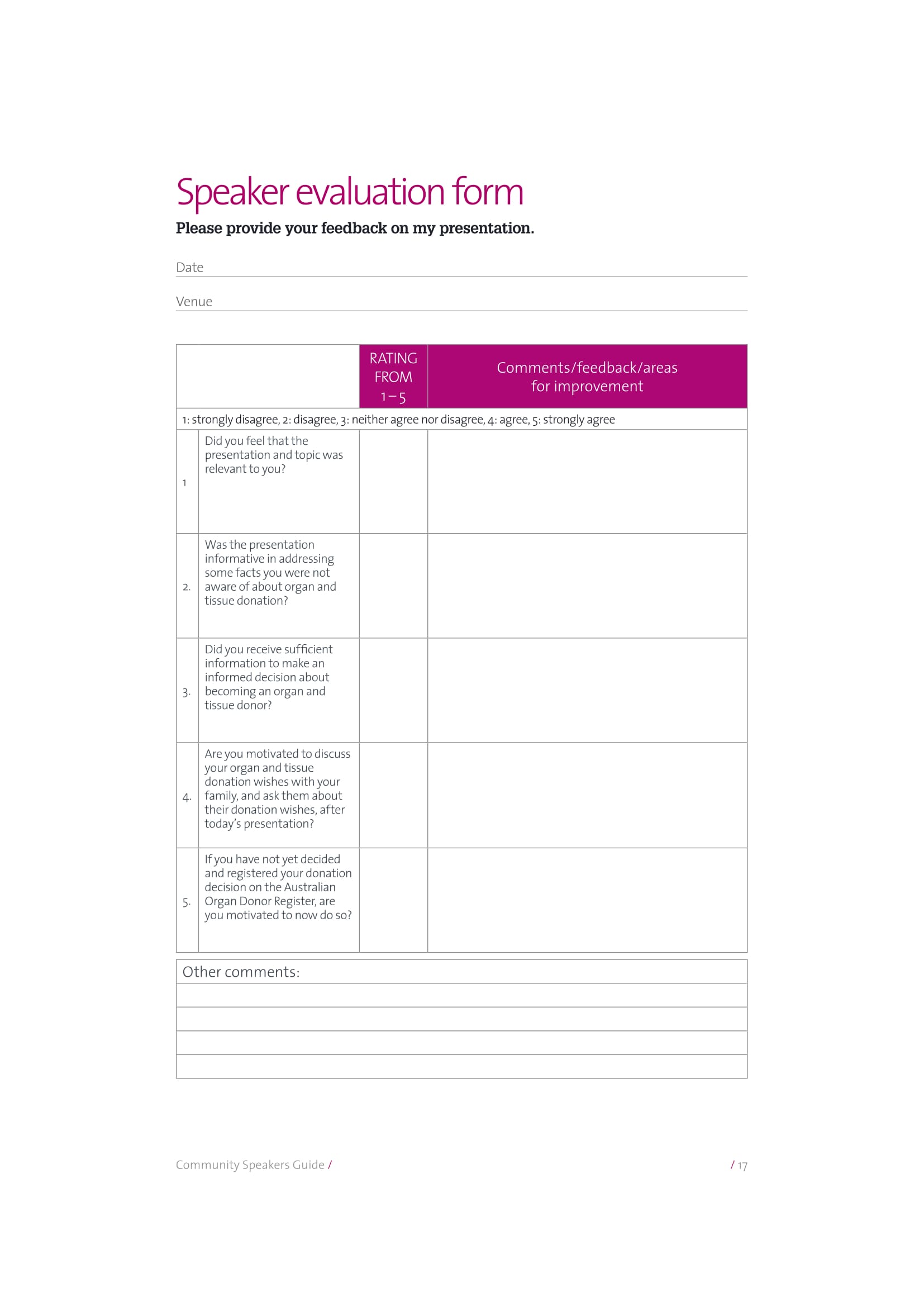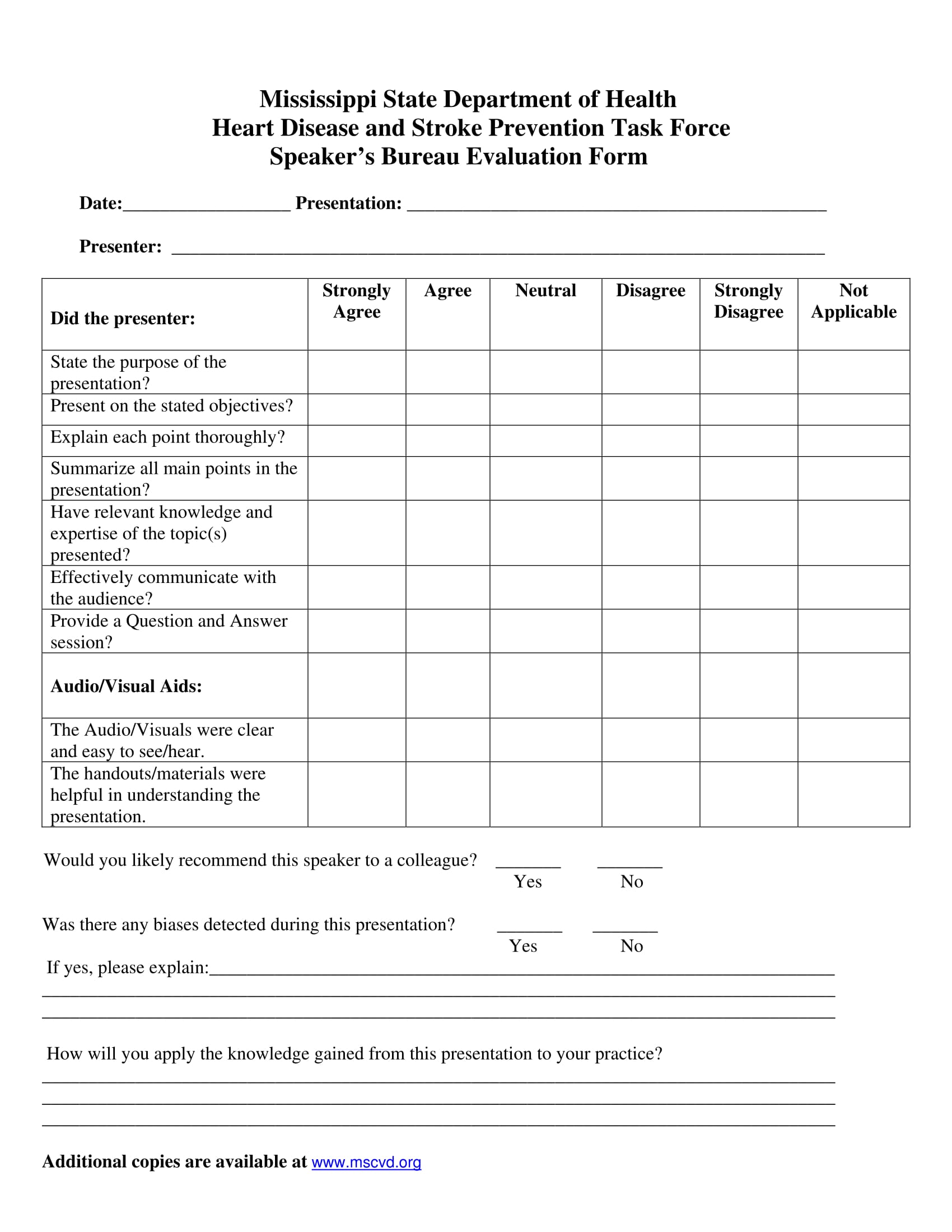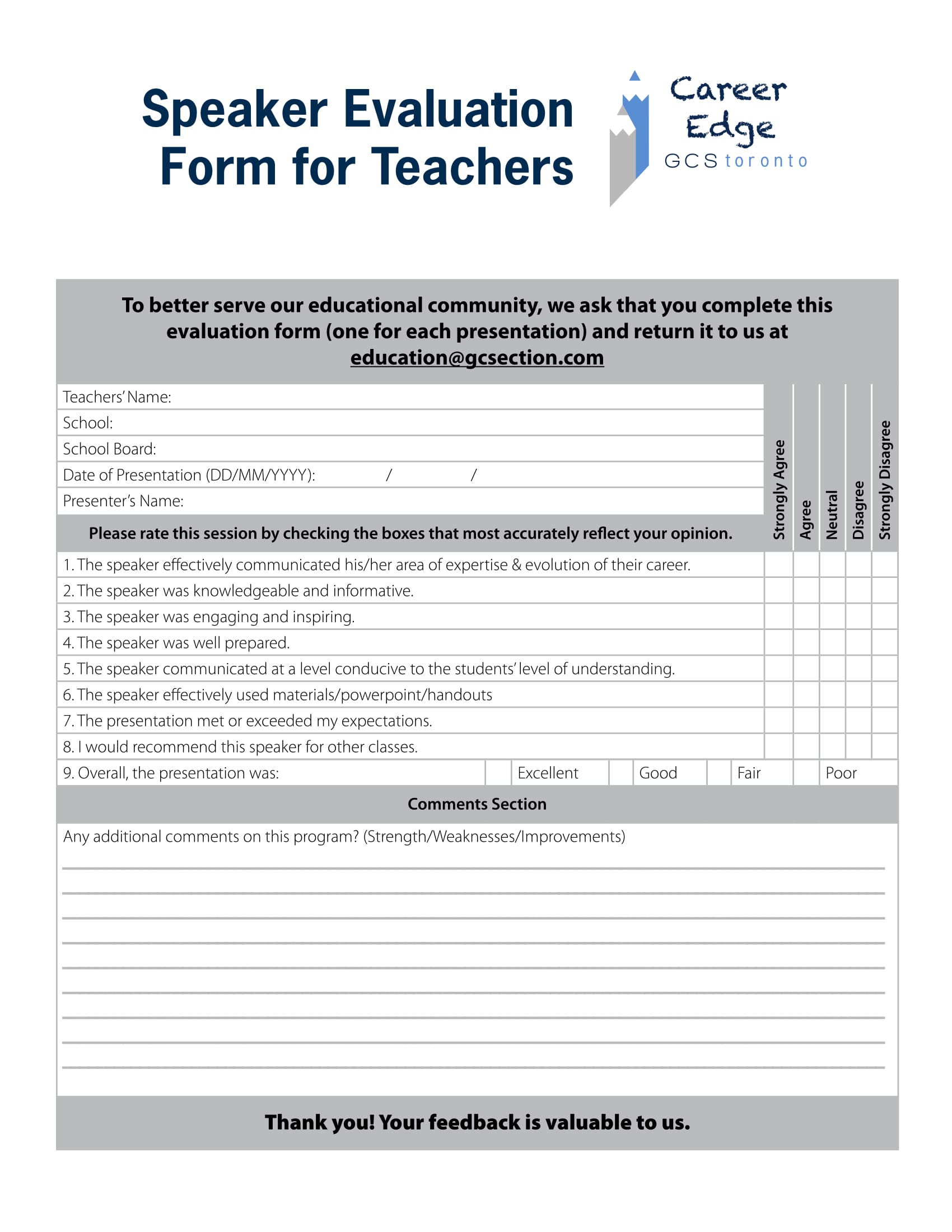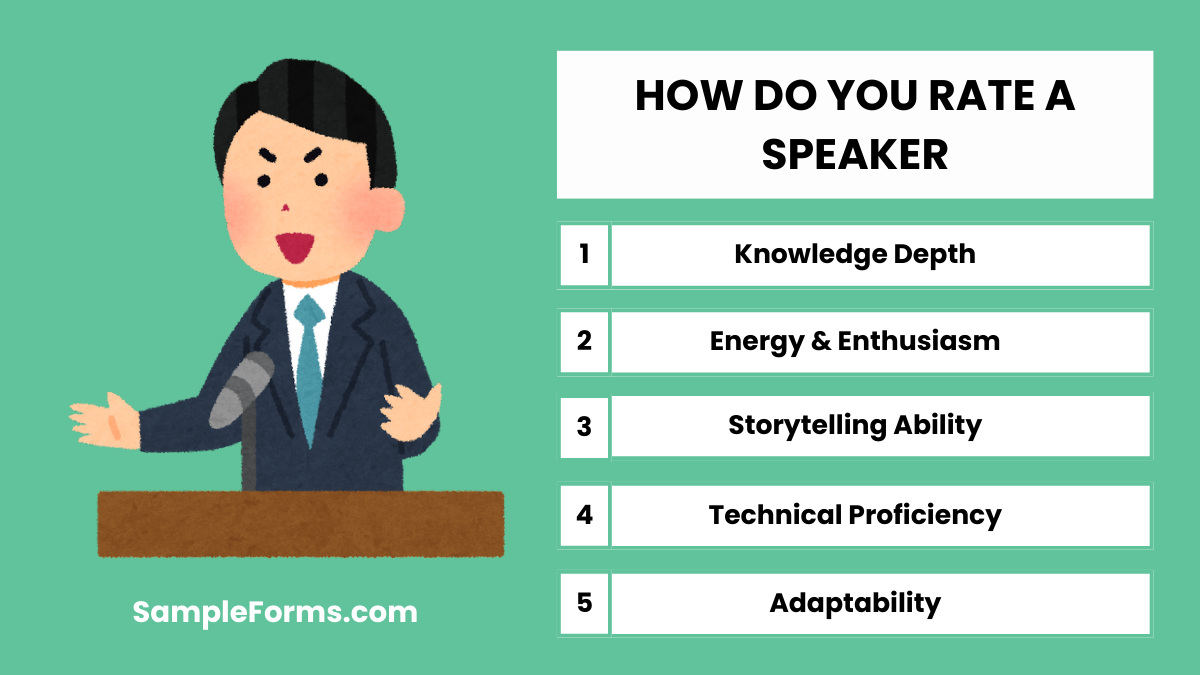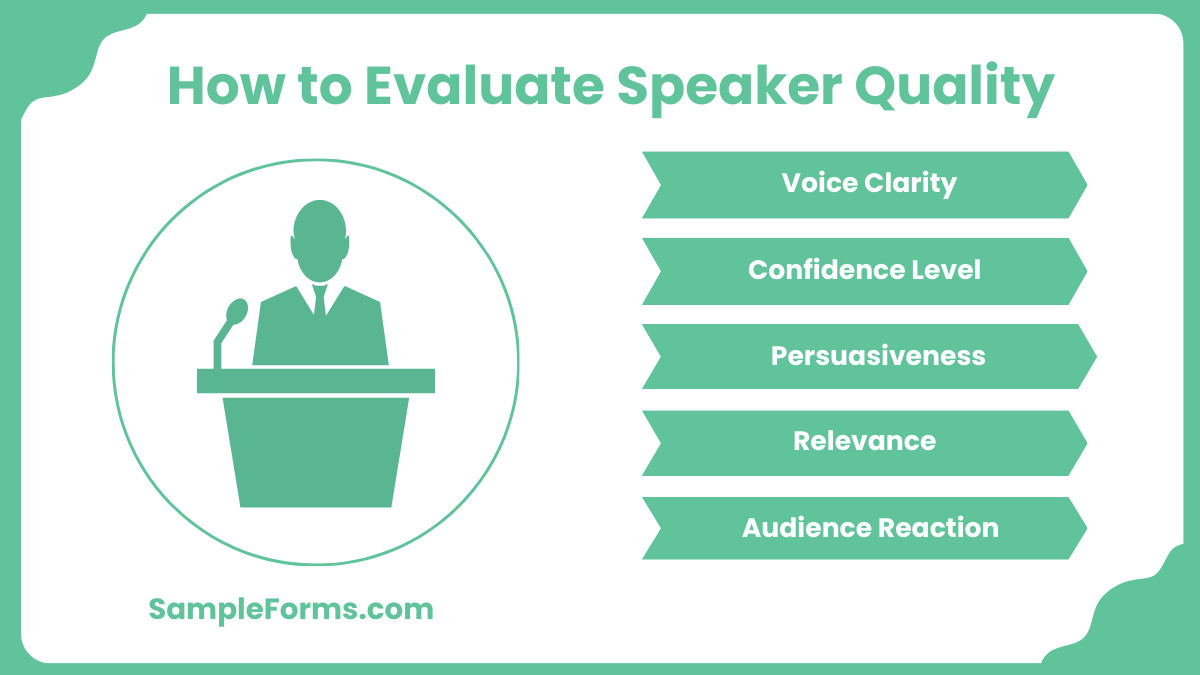A Speaker Evaluation Form is a structured tool used to assess a speaker’s effectiveness, delivery, and engagement. It helps event organizers collect valuable feedback from attendees, ensuring improved future presentations. Whether for corporate training, webinars, or public speeches, an Evaluation Form is essential for measuring a speaker’s impact. This guide explores the key components, benefits, and sample templates to create a well-structured evaluation form.
Download Speaker Evaluation Form Bundle
What is Speaker Evaluation Form?
A Speaker Evaluation Form is a feedback tool designed to assess a speaker’s presentation skills, clarity, engagement, and effectiveness. It allows event organizers to gather audience insights, helping speakers refine their delivery. Typically, these forms include rating scales, open-ended questions, and sections for suggestions. Whether for conferences, training sessions, or webinars, a Speaker Evaluation Form ensures continuous improvement in public speaking quality.
Speaker Evaluation Format
Event Details
- Event Name: ___________________________
- Date: ___________________________
- Speaker’s Name: ___________________________
Evaluation Criteria
Content Relevance: ___________________________
Presentation Skills: ___________________________
Audience Engagement: ___________________________
Time Management: ___________________________
Overall Feedback
Highlights of the Presentation: ___________________________
Areas for Improvement: ___________________________
Evaluator’s Signature
- Name: ___________________________
- Date: ___________________________
Speaker Evaluation Form for Students
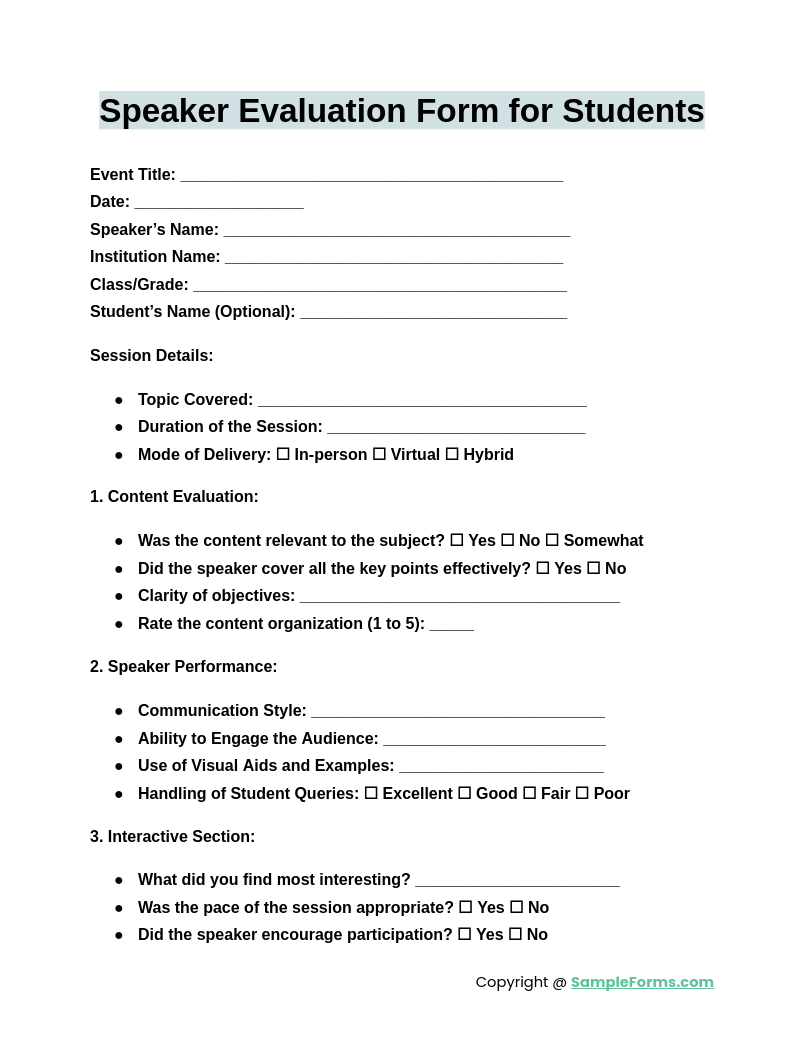
A Speaker Evaluation Form for Students helps assess the effectiveness of lectures and classroom presentations. It enables students to provide structured feedback on content clarity, engagement, and delivery, enhancing future learning experiences. Similar to an Employee Evaluation Form, it ensures performance improvement through critical assessment.
Speaker Evaluation Survey Form
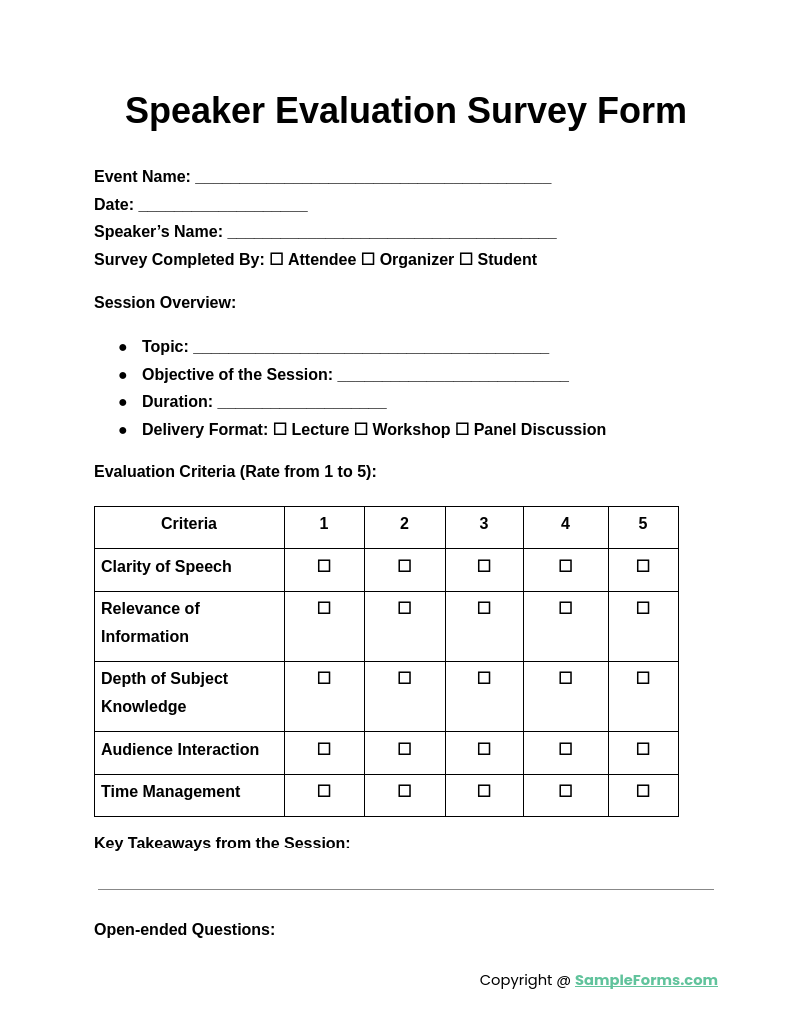
A Speaker Evaluation Survey Form gathers audience insights on a speaker’s effectiveness, confidence, and knowledge delivery. These surveys provide structured feedback that helps in refining speaking strategies, similar to a Training Evaluation Form, which enhances skill development through systematic reviews.
Speaker Evaluation Form for Webinar Speakers
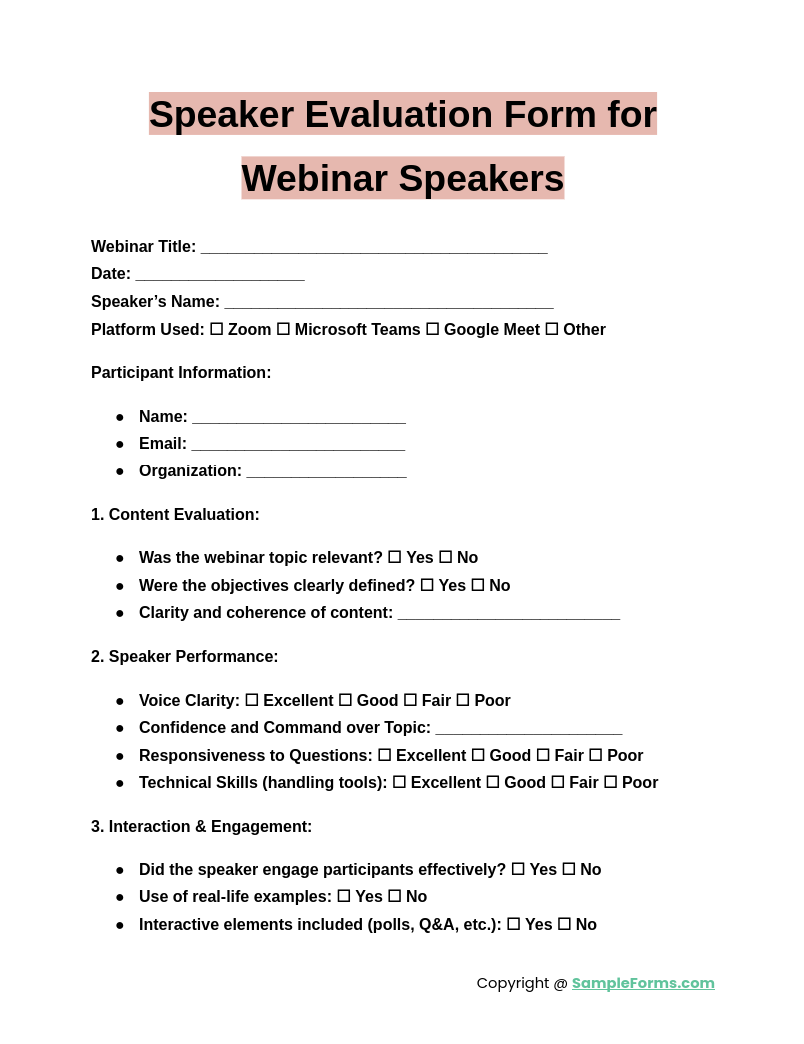
A Speaker Evaluation Form for Webinar Speakers is a tool to assess virtual presentation skills, including interaction, clarity, and engagement. Like an Employee Self Evaluation Form, it allows speakers to reflect on their performance and improve their online communication techniques.
Speaker Evaluation Form Template
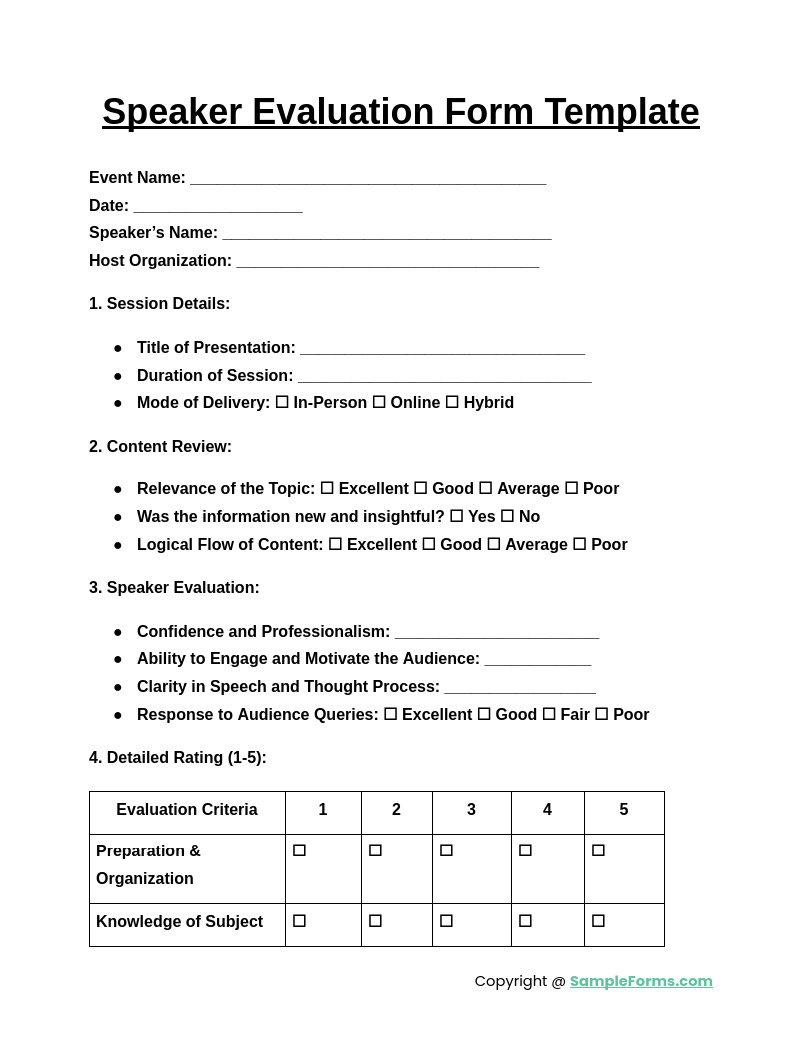
A Speaker Evaluation Form Template provides a structured format for rating speakers on content delivery, engagement, and effectiveness. Similar to a Peer Evaluation Form, it ensures constructive feedback to refine presentation skills and enhance future speaking engagements
Browse More Speaker Evaluation Forms
General Speaker Evaluation Form
Club Speaker Evaluation Form
Engineering Speaker Evaluation Form
Event Speaker Evaluation Form
Guest Speaker Evaluation Form
Law Committee Speaker Evaluation Form
Program Speaker Evaluation Form
Public Speaker Evaluation Form
Seminar Speaker Evaluation Form
Senate Speaker Evaluation Form
Speaker Evaluation Form Sample
Speaker Evaluation Short Form
Speaker Presentation Evaluation Form
Speaker’s Bureau Evaluation Form
Teacher Speaker Evaluation Form
How do you evaluate a speaker?
Evaluating a speaker requires assessing clarity, engagement, and delivery effectiveness. Similar to a Call Monitoring Evaluation Form, structured criteria ensure comprehensive performance analysis.
- Content Relevance: Assess if the speaker’s message aligns with the audience’s needs.
- Delivery Style: Evaluate body language, voice modulation, and confidence.
- Audience Engagement: Measure how well the speaker interacts with listeners.
- Clarity & Structure: Ensure speech follows a logical flow with clear points.
- Visual Aids Usage: Examine how effectively slides, charts, and visuals enhance understanding.
How do you rate a speaker?
Rating a speaker involves evaluating engagement, content accuracy, and professionalism. Similar to a Presentation Evaluation Form, structured feedback ensures improvement in communication skills.
- Knowledge Depth: Judge subject matter expertise and accuracy.
- Energy & Enthusiasm: Determine enthusiasm level in delivering the message.
- Storytelling Ability: Assess usage of examples, anecdotes, and analogies.
- Technical Proficiency: Evaluate proper microphone and AV equipment use.
- Adaptability: Analyze response to unexpected challenges or audience concerns.
How do you measure speaker performance?
Speaker performance is measured using structured evaluation methods. Like an Interview Evaluation Form, criteria such as articulation, confidence, and audience response determine effectiveness.
- Speaking Clarity: Assess pronunciation, articulation, and tone.
- Presentation Impact: Analyze audience engagement levels and participation.
- Confidence & Poise: Observe speaker composure and command over the topic.
- Response to Questions: Evaluate ability to answer audience inquiries effectively.
- Time Management: Ensure speech duration aligns with allocated time.
What are the major elements in the evaluation?
A speaker evaluation focuses on three core elements: delivery, content, and engagement. Like a Food Sensory Evaluation Form, assessment involves structured rating criteria.
- Verbal Delivery: Measures tone, pace, and articulation effectiveness.
- Content Structure: Ensures logical organization of key ideas.
- Audience Connection: Evaluates interaction, engagement, and relatability.
- Visual Support: Examines effectiveness of visual aids in enhancing speech.
- Memorability: Assesses whether key takeaways leave a lasting impression.
How to evaluate speaker quality?
Speaker quality is determined by clarity, confidence, and audience impact. Similar to a Speech Evaluation Form, structured feedback enhances overall effectiveness.
- Voice Clarity: Ensures speaker articulates clearly and audibly.
- Confidence Level: Observes speaker’s ability to maintain composure.
- Persuasiveness: Evaluates how convincingly the speaker presents ideas.
- Relevance: Checks if the speech aligns with audience expectations.
- Audience Reaction: Measures engagement through feedback, body language, and response.
How do you evaluate what a speaker says?
Evaluating a speaker involves assessing clarity, engagement, and message relevance. A structured Evaluation Report Form ensures comprehensive feedback on delivery, content accuracy, and audience impact.
How do you test the performance of a speaker?
Speaker performance is tested through clarity, confidence, and audience interaction. Using a Sales Evaluation Form, feedback covers delivery effectiveness, engagement level, and speech impact.
What is an example of positive feedback for a speaker?
A great speaker engages and informs effectively. “Your presentation was insightful and well-structured, keeping the audience engaged throughout.” Similar to a Candidate Evaluation Form, structured feedback enhances improvement.
How to write a review for a speaker?
A review should highlight strengths and suggest improvements. A Employee Self Evaluation includes content clarity, confidence, audience engagement, and practical takeaways.
How do you compliment a speaker?
Compliments should acknowledge clarity, impact, and engagement. “Your speech was inspiring and well-organized.” Like a Customer Service Evaluation Form, structured appreciation fosters motivation.
How do you test if a speaker is good or bad?
Testing a speaker’s effectiveness involves assessing voice modulation, audience engagement, and delivery. A Bid Evaluation Form provides structured feedback for speech improvement.
How do you know if a speaker is powerful?
A powerful speaker captivates, persuades, and inspires. Using a Basketball Evaluation Form, evaluation covers confidence, delivery effectiveness, and connection with the audience.
What is the most common way speech evaluations are given?
Speech evaluations use structured feedback forms, peer reviews, or professional assessments. A Restaurant Employee Evaluation Form helps ensure constructive insights for speaker improvement.
How do you describe an effective speaker?
An effective speaker is clear, confident, and engaging, delivering messages persuasively. A Financial Evaluation Form measures speech effectiveness and impact.
What are the three most important qualities of a good speaker?
Clarity, confidence, and audience engagement define a good speaker. A Resume Evaluation Form ensures these qualities are analyzed for improvement.
A Speaker Evaluation Form is essential for measuring presentation effectiveness. By collecting structured feedback, event planners and speakers can refine their content, delivery, and audience engagement. Whether assessing corporate seminars or academic lectures, these forms play a key role in improving public speaking experiences. Explore various formats, samples, and templates to create an evaluation form tailored to your needs. For structured feedback collection, refer to our Proposal Evaluation Form guide.
Related Posts
-
FREE 6+ Business Credit Checklist Forms in PDF
-
Employee Pay Increase Form
-
Chef Evaluation Form
-
FREE 8+ Kitchen Evaluation Forms in PDF | MS Word
-
Customer Service Evaluation Form
-
FREE 15+ Grant Evaluation Forms in PDF | MS Word
-
FREE 14+ Volunteer Evaluation Forms in PDF
-
Mentee Evaluation Form
-
FREE 14+ Vehicle Evaluation Forms in PDF
-
FREE 14+ Trainee Evaluation Forms in MS Word | PDF
-
Resume Evaluation Form
-
Debate Evaluation Form
-
FREE 14+ Retreat Evaluation Forms in PDF
-
FREE 14+ Book Evaluation Forms in PDF | MS Word
-
Food Evaluation Form
